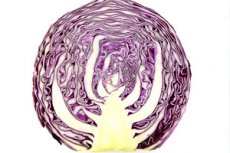New publications
Benefits of red cabbage juice in inflammatory bowel disease
Last reviewed: 02.07.2025

All iLive content is medically reviewed or fact checked to ensure as much factual accuracy as possible.
We have strict sourcing guidelines and only link to reputable media sites, academic research institutions and, whenever possible, medically peer reviewed studies. Note that the numbers in parentheses ([1], [2], etc.) are clickable links to these studies.
If you feel that any of our content is inaccurate, out-of-date, or otherwise questionable, please select it and press Ctrl + Enter.

A team of researchers from the University of Missouri is exploring how red cabbage juice, long used in folk medicine, can ease inflammatory digestive diseases such as inflammatory bowel disease (IBD) in mice, offering hope to the estimated 5 million people worldwide who suffer from IBD, including Crohn's disease and ulcerative colitis.
The article, "Gut microbiota modulation with red cabbage juice improves intestinal epithelial homeostasis and alleviates colitis," was published in the International Journal of Molecular Sciences.
IBD is characterized by chronic inflammation in the digestive tract. The main symptoms include severe abdominal pain, weight loss, anemia, and diarrhea. In severe cases, IBD can increase the risk of death if left untreated.
Santayana Rachagani, an assistant professor in the Department of Veterinary Medicine and Surgery and the Roy Blunt NextGen Precision Health Center at the University of Missouri, leads a team that is making breakthroughs in nutraceuticals — medicinal effects from natural products — to modulate gut microbiota and alleviate inflammatory diseases like IBD. Rachagani’s team has found that red cabbage juice contains a variety of bioactive compounds that improve gut health and alleviate IBD symptoms in mice.
"Red cabbage juice alters the composition of the gut microbiota, increasing the number of beneficial bacteria, which leads to increased production of short-chain fatty acids and other bacterial metabolites that mitigate inflammation," Rachagani said. "These changes in the gut microbiota are associated with improved gut barrier function, enhanced colonic repair, and antioxidant effects, which ultimately reduces gut damage and colonic inflammation."
Mice are widely used to study IBD because colitis in mice closely resembles ulcerative colitis in humans. Therefore, the study results provide potentially valuable data on the benefits of red cabbage juice for people with inflammatory bowel disease and other IBD symptoms.
Nagabhishek Sirpu Natesh, a postdoctoral fellow working on the project, said that treatment with red cabbage juice increased the number of beneficial bacteria in the gut, which in turn activated an anti-inflammatory receptor in the colon of mice. In addition, red cabbage juice increased the number of regulatory T cells, promoting anti-inflammatory immune balance and further reducing colon inflammation.
Currently, the main pharmacological treatment for IBD is monoclonal antibodies that target inflammation. However, most patients find that the effectiveness of this treatment decreases over time. Therefore, researchers are increasingly looking for solutions that target the molecular mechanism in the gut that causes IBD.
"These results provide new insights into the mechanisms of therapeutic efficacy of red cabbage juice in alleviating IBD," Rachagani said. "Its ability to modulate gut microbiota, activate anti-inflammatory pathways, and enhance immune regulation highlights its potential as a valuable therapeutic agent for IBD and related inflammatory diseases."
Not only do the bioactive compounds promote the growth of beneficial bacteria in the gut, but red cabbage juice is also an excellent source of dietary fiber, further enhancing its gut health potential.
